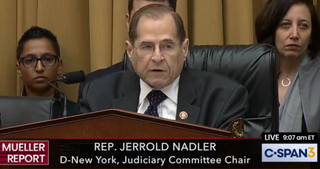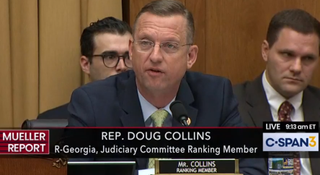Judiciary Chair: Trump Administration Actions Endanger Constitution

House Judiciary Committee chairman Jerry Nadler (D-N.Y.) left no doubt what he thought about President Donald Trump's response to the Mueller report and Attorney General Bill Barr's response--which was "no"--to the committee's subpoena for the unredacted report from Special Counsel Robert Mueller's report on Russian election meddling, which is that it was part of looming constitutional crisis.
Nadler suggested that the committee would hold Barr in contempt if he did not negotiate for that full release.
That came in a brief (about 15-minute) hearing that was to have been a chance for House members to question the attorney general. Barr did not appear after the committee majority Democrats said their staff attorneys would also be questioning him, according to Nadler, and also to the prospect of having to discuss some sensitive topics in executive session.
Nadler said that after what he suggested was Barr's less than forthcoming testimony before other committees--Senate Democrats accused Barr of not being truthful in testimony about the report--he was right to insist on the additional questioning
The Republican-led Senate heard from Barr for almost six hours on Wednesday (May 1).
But Nadler looked beyond the format of the hearing and argued that what was at stake was much larger, giving the proceedings more the tone of an impeachment hearing--some have called for Barr's impeachment--as the committee's Republican ranking member, Doug Collins (R-Ga.) suggested.
Noting that the Administration had rejected the subpoena for the unredacted Mueller report, beyond allowing a dozen members to see a less redacted version on the promise of not sharing it or their notes from the meeting with colleagues, Nadler said the Administration can't be allowed to dictate the terms to a co-equal branch.
Broadcasting & Cable Newsletter
The smarter way to stay on top of broadcasting and cable industry. Sign up below
Nadler said ignoring the subpoena was an act of "obstruction," obviously a loaded word given that it was Barr's conclusion the President did not obstruct the Mueller investigation that in part prompted the hearing.
Nadler proceeded to expand the issue beyond that report.
"If all we knew about President Trump were contained in the four corners of that report, there would be good reason to question his fitness for office," but the report is not where the story ends," he said, pointing to the Administration's pledge to fight "all of our subpoenas."
He called that a promise to "obstruct" the work of the Justice Committee that extended far beyond "his contacts with the Russian government and allegations of obstruction of Justice to preventing the committee from obtaining information about "voting rights, ACA [Affordable Care Act] litigation and his cruel family separation policy, among other matters."
He widened it again beyond the committee to the President's refusal to produce his tax returns and the President's lawsuit against Rep. Elija Cummings (D-Md.) to block the release of financial documents.
Nadler said the President wants "desperately" to prevent Congress from providing any check on even his most reckless decisions and "is trying to render Congress inert." Nadler said if Congress does not stand up to him now, it risks "forever losing the power to stand up to any President." He said the system of "not having the President as a dictator is very much at stake."
He said the Congress and the country were faced with a simple choice: "We can stand up to this President in defense of the country and the constitution and the Liberty we love or we can let the moment pass us by." He said he did not know what others might choose, others being Attorney General Bill Barr or his Republican colleagues, but he said he was certain "there is no way forward for this country that does not include a reckoning with this clear and present danger to our constitutional order."

Collins chose to push back hard on Nadler's characterization. He said there was only one reason Barr was not there, and that was the chairman's "unreasonable demands" and the Democrats' desire for a political circus.
Collins said Republicans had been willing to allow for some staff counsel questions and extra time for members, but the chairman instead preferred a "circus political stunt" to make it look like an impeachment hearing because they won't bring impeachment proceedings. That's the reason."
He said not hearing from the attorney general was a travesty, but said the bigger travesty was that the chairman, in trying to hammer out the terms of Barr's testimony the day before, had essentially obstructed the minority's ability to negotiate, failing to recognize members for valid motions, calling their motions dilatory or ridiculous, and questioning the motives of members.
"The reason Bill Barr is not here today is because the Democrats decided they didn't want him here today," Collins said.
Contributing editor John Eggerton has been an editor and/or writer on media regulation, legislation and policy for over four decades, including covering the FCC, FTC, Congress, the major media trade associations, and the federal courts. In addition to Multichannel News and Broadcasting + Cable, his work has appeared in Radio World, TV Technology, TV Fax, This Week in Consumer Electronics, Variety and the Encyclopedia Britannica.

